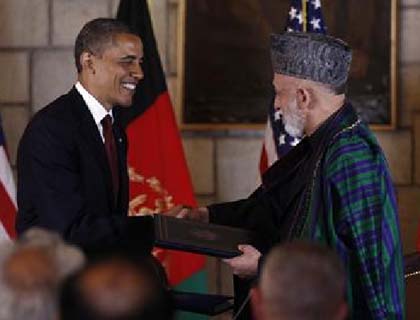KABUL - The signing of the planned the Bilateral Security Agreement (BSA) between Kabul and Washington, that would let the US forces stay post-2014 in Afghanistan, still remains under serious threat because of disagreement between both the sides. Aimal Faizi, the spokesman of President Karzai, announced that Karzai is now directly leading the talks after they were grounded to a halt despite the US pressure to complete the security agreement by the end of this month.
"The US wants the freedom to conduct military operations, night raids and house searches," Mr. Faizi told AFP.
"According to them, there are 75 Al-Qaeda operatives in Afghanistan, which is very strange as this agreement will be for 10 years to have the right to conduct military operations anywhere in the country. Unilaterally having the right to conduct military operations is in no way acceptable for Afghans," he said.
Mr. Faizi also said that the two sides could not agree on how the BSA should define an attack on Afghanistan that would trigger US protection.
"We believe that when terrorists are sent to commit suicide attacks here, that is also aggression," Mr. Faizi said in a reference to Pakistan-based militants whom Afghanistan believes are supported by Pakistani intelligence services.
"We are a strategic partner of the US and we must be protected against foreign aggression. For us and for the US, that is the conflicting point. We are not of the same opinion and we need clarity from the US side," he said.
Meanwhile, a number of Afghan political experts have said that President Karzai wants to score some golden points by the signing the agreement.
"The Afghan government is concerned about its own future, so President Karzai is striving to score more points from the agreement for his own benefit," said Tahir Hashimi, Kabul University lecturer.
"If the BSA is not signed, Afghanistan will face some serious challenges. Both the parties should settle the dispute through diplomatic means," said Qazi Muhammad Ismail Azad, an Afghan civil society activist.
The BSA is meant to provide the roadmap for the U.S. security role in Afghanistan after the bulk of troops are withdrawn, when the official NATO combat mission ends in December, 2014. It was created as part of the U.S.-Afghanistan Strategic Cooperation Agreement, which was put into place in July of 2012. Although largely established already, the final signing of the BSA has been delayed due to a number of issues.
The issue of legal immunity for the U.S. troops is said to be one of the major sticking points in negotiations, as it was for the U.S. when it went through the same process in Iraq. Nevertheless, despite leaks coming out of the White House regarding the potential of a "zero option" – where no troops would be left in Afghanistan post-2014 – like in Iraq, experts say such a scenario would be foolish and is highly unlikely.
Back in June, President Hamid Karzai said he was going to freeze talks with the U.S. over the BSA following the unraveling of an attempt at peace negotiations with the Taliban in Qatar. He said he would not begin talks again until the Taliban agreed to meet with the Afghan High Peace Council (HPC). It would appear lines of communication have been re-opened despite no official peace process with the Taliban being restarted yet.
Washington has been pressing the Afghan government to ink the BSA as quickly as possible. But, the Afghan authorities made it clear that they will sign the agreement only if the US accepts all the terms and conditions put front by Kabul.
On Sunday, Ash Carter, the US Deputy Secretary of Defense, during his visit to Kabul earlier this month said that it would be a "tragedy" if the US and Afghan negotiators failed to sign the BSA, allowing the US troops to stay in the country after 2014.
Mr. Carter told the Afghan officials that President Barack Obama wants to see a signed BSA as quickly as possible to provide "certainty" to the US commanders.
There are around 100,000 foreign troops in Afghanistan, out of which around 68,000 are Americans.
Foreign forces are scheduled to leave by the end of 2014 with the end of the NATO combat mission, after which time the Afghan security forces – currently numbering at around 300,000 men – will take over full security responsibility of the country. (Tolo News)

